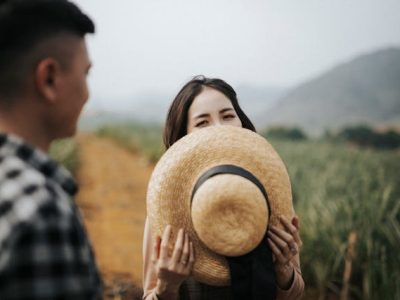.jpg)
The Ojibwa Legend of the Origin of the Robin
The Ojibwa legend that explains the origin of the robin depicts a beautiful parent-child relationship. The story informs that mother Robin risked her life to care for her children, and the brave acts of a compassionate man saved and ensured their protection. The legend highlights how selfless love and concern shape an ideal parent-child bond.
Furthermore, this tale signifies a public-spirited community where all members look out for each other’s well-being. The cooperation exhibited by all characters in the legend reflects the core principles of Ojibwa culture – compassion, unity, and sacrifice.
It is interesting to note that Robins are particularly honored among Ojibwe people as they believe these birds bring good luck and symbolize joy and hope. The legend tells how creating a home environment with love and affection can nurture healthy relationships between parents and children.
Pro Tip: One way to strengthen your parental bond is by spending quality time with your child without any distractions like mobile phones or television. This allows you to build numerous memories with them, which stay with both of you forever.
Get ready to learn about Ojibwa views on parent-child relationships: it’s like therapy, but without the co-pay.
Ojibwa Views on Parent-Child Relationships
To know about Ojibwa views on parent-child relationships with the title ‘what does “the origin of the robin” suggest about Ojibwa views of the parent-child relationship?’, dive into the contrasting sub-sections namely The Importance of Respect and Guidance, and The Role of Storytelling and Oral Tradition. These will give you a deeper understanding of how Ojibwa culture perceives the crucial bond between a parent and their child.
The Importance of Respect and Guidance
Respect and Guidance hold significant value in Ojibwa Parent-Child Relationships. Parents play a crucial role as guides for their children, building trust and security.
They believe that mutual respect between parent-child can ensure healthy communication and long-term relationships. By respecting the child’s thoughts and opinions, parents can develop a sense of independence in children.
Moreover, providing guidance to their children by passing down traditional teachings which instills values of love, compassion, and humility can help connect them with cultural roots. The importance of Respect and Guidance also lies in establishing boundaries for children that promotes good behavior during their growth stage.
It is noteworthy that the Ojibwa way of parenting is based on the belief that every living being has a spirit or soul which needs to be nurtured and respected. Hence, parents should strive to create an environment where they can teach their children about nature and all living beings’ interconnectedness.
Adapting such principles into modern-day parenting practices enamors lasting bonds between parents and their offspring whilst creating empathetic individuals who respect all living beings on this planet.
Who needs books when you have an Ojibwa grandparent with vivid storytelling skills?
The Role of Storytelling and Oral Tradition
Storytelling and the passing down of traditions through oral means play a crucial role in Ojibwa parent-child relationships. By sharing their cultural beliefs and values, parents can transmit knowledge to their children that can guide them throughout life. This practice allows parents to build a strong relationship with their children based on trust and respect while instilling a sense of belonging to their culture.
Furthermore, narrative-based teaching helps children develop essential skills such as problem-solving and empathy. The stories serve as valuable tools for transmitting socialization practices that encourage collaboration, cooperation, and respect for others.
One example of an Ojibwa tradition passed down through storytelling is the importance of observing eco-centric beliefs. In many stories, animals are portrayed as wise teachers who can impart valuable lessons on humans. These tales encourage humility and promote environmental preservation.
Traditions like these continue to hold great significance for many Ojibwa families today. For instance, within my extended family, the passing down of stories has been central to our understanding of who we are as both Indigenous people and individuals.
My grandmother would tell us stories about her encounters with spirits on long walks through the wilderness. When I first heard these tales, I was afraid, but over time I came to see them as a source of connection with my ancestors- an important part of my identity which I cherish today.
Why did the Ojibwa consider the robin to be a symbol of love and commitment? Because they knew it always comes back home.
Symbolism of the Robin in Ojibwa Culture
To understand the Ojibwa views of the parent-child relationship, explore the symbolism of the robin in their culture. The robin is considered a messenger of hope and renewal, and a teacher of perseverance and responsibility. These two sub-sections shed light on the importance of the robin in Ojibwa culture and how it influences their views of the parent-child relationship.
The Robin as a Messenger of Hope and Renewal
The Robin symbolizes new beginnings, hope and renewal in Ojibwa culture. It is believed that when a Robin enters a home, it brings good luck and happiness. The bird is often associated with the arrival of spring and the start of a new season. The Ojibwa people believe that the Robin brings positive energy which helps to heal emotional wounds and bring peace to individuals.
In addition to being a positive messenger, the Robin also represents perseverance and hard work. According to Ojibwa teachings, the Robin is known for its diligence in building nests and providing for its young ones. This teaches individuals about perseverance even in tough times.
Unique details about the symbolism of Robin among the Ojibwa community include avoidance of killing Robins as they hold great cultural significance where some people use their eggs for medicinal purposes as it is said that Robin’s eggs have healing powers.
Pro tip: If you encounter a Robin singing or chirping aloud near your window or backyard, take it as an omen for great things to come or as guidance towards some major life changes. The Robin may not be the hero we want, but it’s the one that teaches us to never give up on our responsibilities.
The Robin as a Teacher of Perseverance and Responsibility
The Robin, a significant bird in Ojibwa Culture, functions as an emblem of resilience and accountability. It exemplifies how perseverance by consistently seeking food and nurturing their young ones is vital to survival.
Throughout time in Ojibwa culture, the Robin has been revered as a diligent worker. Its activities are thought to be indicative of hard labour that requires patience, courage, and plenty of elbow grease. The Robin inspires perseverance and responsibility by symbolizing these attributes through its daily routine.
Pre-dawn, Robins begin exploring fields for sustenance before returning with a full crop to attend to their offspring’s needs. These birds demonstrate investing unbroken attention and effort in rearing their hatchlings while preserving the warmth of their nest using constant attention.
The Robin exemplifies consistency in its endeavours; it always approaches tasks with unwavering dedication towards accomplishing them no matter the challenges that stand on its way. Similarly, we can apply this quality in our lives by staying committed towards completing our objectives regardless of adversities that may hinder progress.
Once upon a time in Minnesota forest lands sat an Anishinaabe medicine man receiving direction from his ancestors regarding his destiny. He watched Robins building nests outside his window throughout the month that he spent fasting; this served as an example to keep faith alive even during times of uncertainty.
Understanding Ojibwa Views on Parent-Child Relationships: It’s like reading a really good novel, but with less happy endings.
Conclusion: Understanding Ojibwa Views on Parent-Child Relationships through literature.
By analyzing the Ojibwa tale ‘The Origin of the Robin,’ we can gain insights into their perspectives on the parent-child relationship. This literature showcases how parents pass down teachings and traditions to their children through stories, emphasizing the importance of passing on cultural values. Additionally, it highlights how the relationship between parents and children is essential for survival, as the mother bird sacrifices herself for her young in the story.
Understanding Ojibwa views on parent-child relationships through literature is an excellent way to learn about their culture’s values and beliefs. Their tales often showcase how important it is to respect one’s elders, maintain familial bonds, and pass down teachings to future generations. These values are integral to their community’s stability and thus hold great significance in their culture.
One unique detail emphasized in ‘The Origin of the Robin is that even though they belong to different species, all birds have a special connection that unites them – caring for their young. This aspect emphasizes the universal importance of nurturing and caring for a child within different species.
A respected elder once said that passing down stories from generation to generation perpetuates traditions that can never be lost as they become ingrained in our DNA. When the memories start fading away from people’s minds, these stories will keep them intact forever. Storytelling not only reinforces values but also forms essential bonds between storytellers and listeners across cultures and time periods alike.
Frequently Asked Questions
1. What is the origin of the robin in Ojibwa culture?
The Ojibwa believe that the robin was created by the spirit of the sky to bring sunshine and joy to the world.
2. What does the robin symbolize in Ojibwa culture?
The robin is seen as a symbol of happiness, good luck, and renewal in Ojibwa culture.
3. How does the robin relate to the parent-child relationship in Ojibwa culture?
The robin is seen as a role model for the parent-child relationship in Ojibwa culture. The robin shows how parents should care for their young and teach them important life skills.
4. How do the Ojibwa view the parent-child relationship?
The Ojibwa view the parent-child relationship as one of the most important connections in life. Parents are seen as the primary teachers and role models for their children, and they are expected to provide love, support, and guidance to their offspring.
5. What can we learn from the Ojibwa views on the parent-child relationship?
We can learn that parents have a crucial role to play in the upbringing of their children. By providing love, support, and guidance, parents can help their children develop into happy, healthy, and successful adults.
6. How can we apply the Ojibwa views on the parent-child relationship in our own lives?
We can apply the Ojibwa views on the parent-child relationship by striving to be good role models and teachers for our children. By providing love, support, and guidance, we can help our children grow into happy, healthy, and successful individuals.








